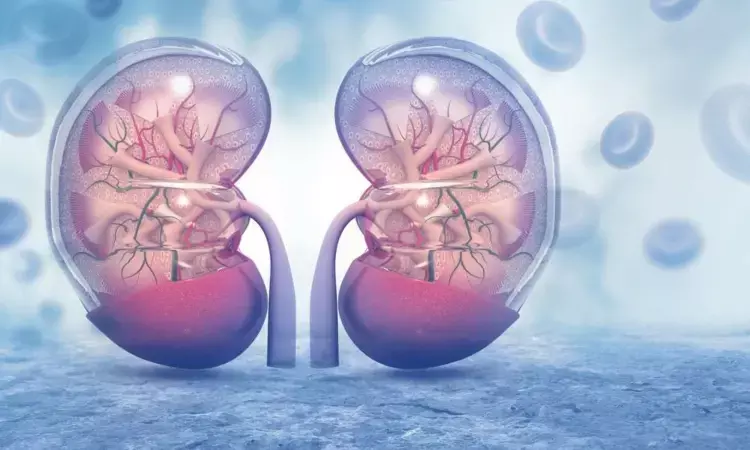- Home
- Medical news & Guidelines
- Anesthesiology
- Cardiology and CTVS
- Critical Care
- Dentistry
- Dermatology
- Diabetes and Endocrinology
- ENT
- Gastroenterology
- Medicine
- Nephrology
- Neurology
- Obstretics-Gynaecology
- Oncology
- Ophthalmology
- Orthopaedics
- Pediatrics-Neonatology
- Psychiatry
- Pulmonology
- Radiology
- Surgery
- Urology
- Laboratory Medicine
- Diet
- Nursing
- Paramedical
- Physiotherapy
- Health news
- Fact Check
- Bone Health Fact Check
- Brain Health Fact Check
- Cancer Related Fact Check
- Child Care Fact Check
- Dental and oral health fact check
- Diabetes and metabolic health fact check
- Diet and Nutrition Fact Check
- Eye and ENT Care Fact Check
- Fitness fact check
- Gut health fact check
- Heart health fact check
- Kidney health fact check
- Medical education fact check
- Men's health fact check
- Respiratory fact check
- Skin and hair care fact check
- Vaccine and Immunization fact check
- Women's health fact check
- AYUSH
- State News
- Andaman and Nicobar Islands
- Andhra Pradesh
- Arunachal Pradesh
- Assam
- Bihar
- Chandigarh
- Chattisgarh
- Dadra and Nagar Haveli
- Daman and Diu
- Delhi
- Goa
- Gujarat
- Haryana
- Himachal Pradesh
- Jammu & Kashmir
- Jharkhand
- Karnataka
- Kerala
- Ladakh
- Lakshadweep
- Madhya Pradesh
- Maharashtra
- Manipur
- Meghalaya
- Mizoram
- Nagaland
- Odisha
- Puducherry
- Punjab
- Rajasthan
- Sikkim
- Tamil Nadu
- Telangana
- Tripura
- Uttar Pradesh
- Uttrakhand
- West Bengal
- Medical Education
- Industry
Ileostomy development closely linked to renal function deterioration independent of readmission

A new study by John Panizza and team found that regardless of the patient's needs to be readmitted to the hospital, ileostomy development is linked to a decline in renal function. The findings of this study were published in ANZ Journal of Surgery.
Ileostomy creation may be permanent or only temporary in order to disrupt a pelvic anastomosis that has a high risk of septic complications. However, these treatments have a high readmission rate, which is typically brought on by dehydration and linked to acute kidney injury (AKI).
Patients with a freshly established ileostomy were examined for readmission within 60 days after discharge in this investigation. The idea was that high-risk individuals might be recognized by their clinical traits and that when the ileostomy was electively reversed, they would have worse renal function.
The key findings of this study were:
1. The investigation covered a total of 171 patients, with a 38% readmission rate within 60 days following release.
2. Both the readmission and no readmission groups had substantial increases in creatinine from baseline blood tests compared to the day of elective ileostomy closure.
3. In both the readmission and no readmission groups, there was a substantial decline in eGFR from baseline blood tests compared with the date of ileostomy closure.
4. At the time of ileostomy closure, there was no discernible change in creatinine levels or eGFR between the readmission and no readmission groups.
5. In the readmission group compared to the no readmission arm, baseline serum sodium levels were lower.
The development of an ileostomy is linked to a statistically significant decline in renal function. All types of ileostomy patients must be included in any future research on techniques for enhancing hydration concluded the Authors.
Reference:
Panizza, J., Swee, Y. J. S., Edmundson, A., & Clark, D. (2023). Renal dysfunction occurs following ileostomy formation and is independent of readmission. In ANZ Journal of Surgery. Wiley. https://doi.org/10.1111/ans.18254
Neuroscience Masters graduate
Jacinthlyn Sylvia, a Neuroscience Master's graduate from Chennai has worked extensively in deciphering the neurobiology of cognition and motor control in aging. She also has spread-out exposure to Neurosurgery from her Bachelor’s. She is currently involved in active Neuro-Oncology research. She is an upcoming neuroscientist with a fiery passion for writing. Her news cover at Medical Dialogues feature recent discoveries and updates from the healthcare and biomedical research fields. She can be reached at editorial@medicaldialogues.in
Dr Kamal Kant Kohli-MBBS, DTCD- a chest specialist with more than 30 years of practice and a flair for writing clinical articles, Dr Kamal Kant Kohli joined Medical Dialogues as a Chief Editor of Medical News. Besides writing articles, as an editor, he proofreads and verifies all the medical content published on Medical Dialogues including those coming from journals, studies,medical conferences,guidelines etc. Email: drkohli@medicaldialogues.in. Contact no. 011-43720751


